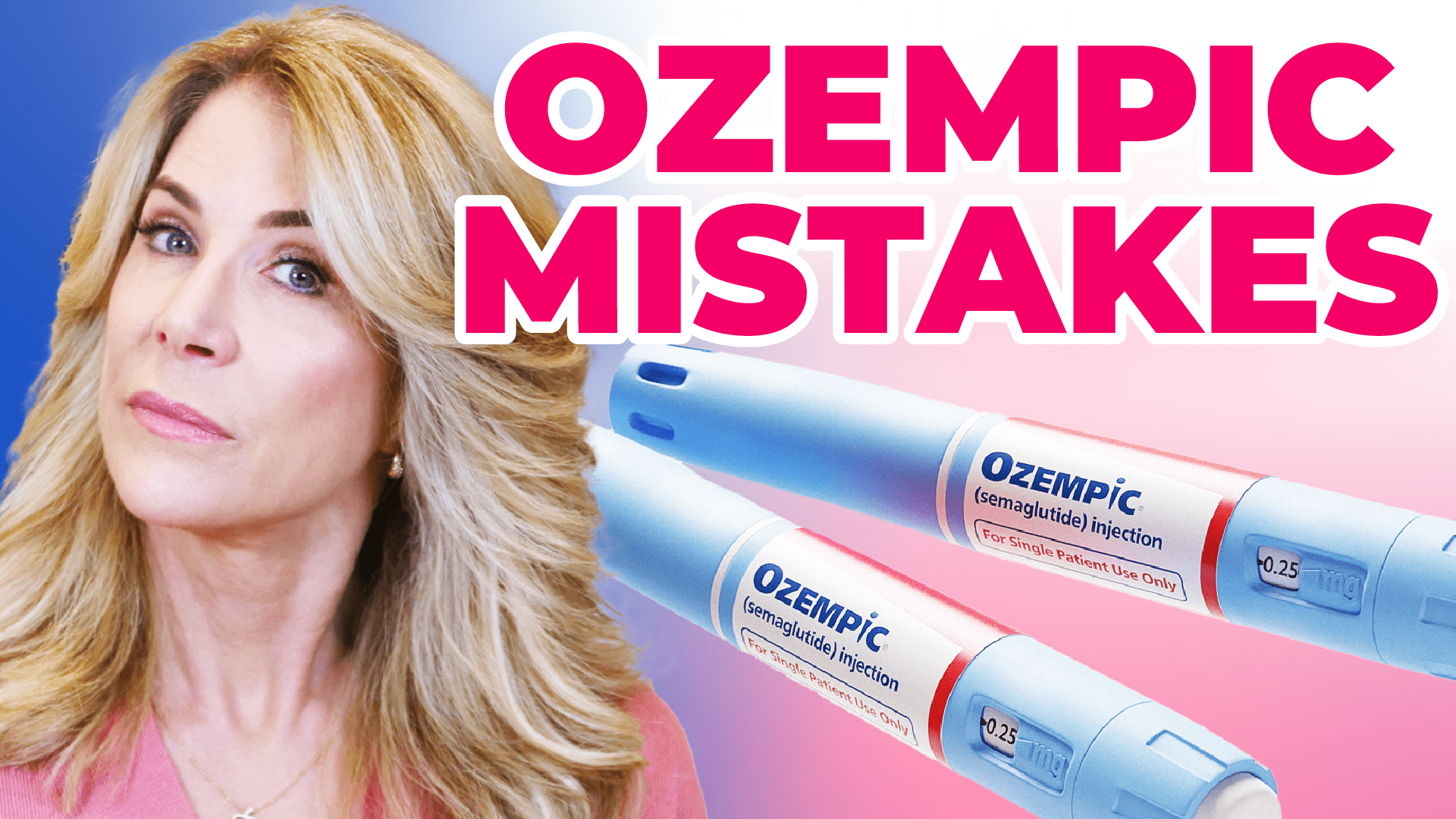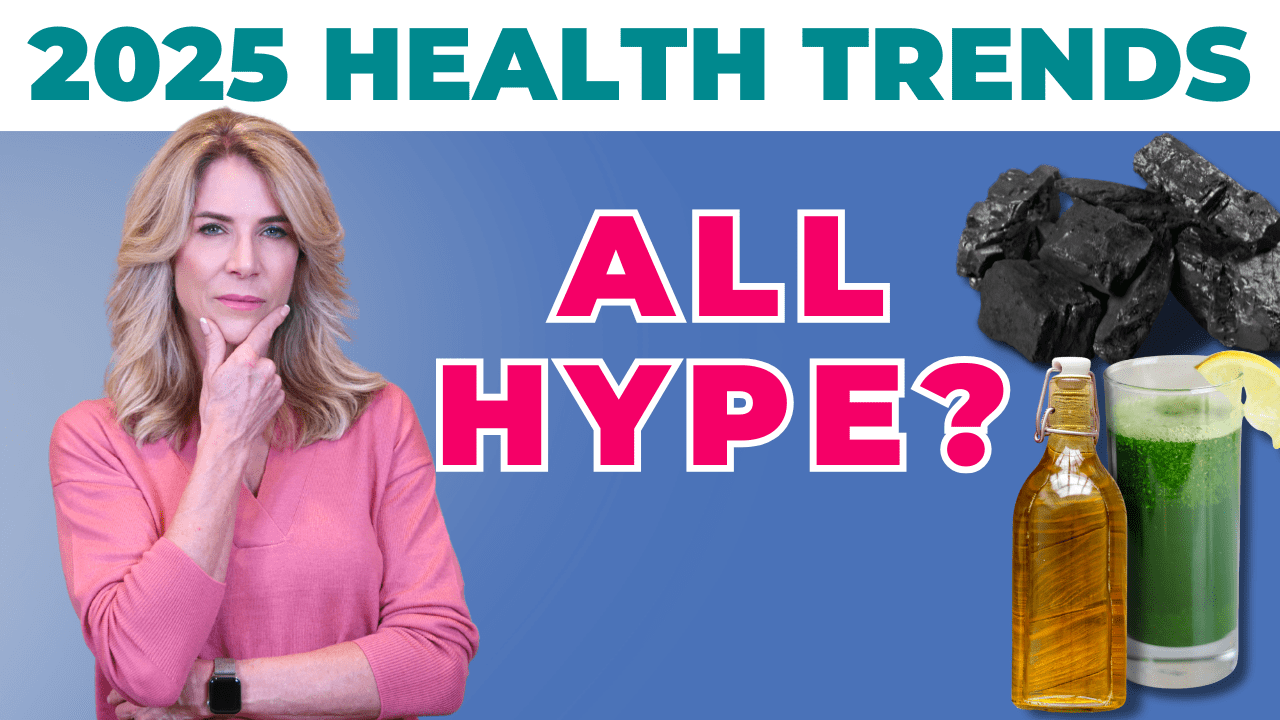Unlock Better Results: Top Errors to Avoid on Your Path to Health
In this episode, I delve into the essential strategies for using weight loss peptides like Ozempic and Munjaro effectively, ensuring you retain muscle mass while shedding fat. We’ll cover common pitfalls and provide actionable advice to help you navigate your weight loss journey more healthily.
Tune in as I share insights from a 2017 Advances in Nutrition review, which underscores the importance of preserving muscle mass during weight loss. You’ll hear about the critical role of high protein intake and resistance exercise in maintaining your muscle strength and overall physical function.
You’ll learn how much protein you need based on your target body weight and why tracking your intake is crucial. I’ll also introduce you to useful apps to help with this process.
I also share some exciting natural supplements that can enhance your weight loss journey. Set yourself up for success with these expert tips!
Timestamps
00:01:20- Avoiding Muscle Loss During Weight Loss
00:03:21- The Importance of Protein in Weight Loss
00:04:28- The Role of Resistance Training
00:05:38- Understanding GLP-1 and Its Natural Boosters
00:07:18- Supplements to Support GLP-1 Production
00:09:31- The Amazing Potential of Peptides
Resources Mentioned in this episode
Download my free Resistance Training Cheat Sheet
Track your protein & macros with Cronometer App
Try Rx Sugar use code JJVIRGIN20 for 20% off
Try Calocurb and use code JJVIRGIN10 for 10% off your order
Study: Preserving Healthy Muscle during Weight Loss
Episode Sponsors:
Try Timeline. Use code JJ10 for 10% off all products
Try Qualia risk free for up to 100 days and code VIRGINWELLNESS for an additional 15% off
I’m JJ Virgin, PhD dropout, sorry mom, turned four time New York Times bestselling author. Yes, I’m a certified nutrition specialist, fitness hall of famer, and I speak at health conferences and trainings around the globe, but I’m driven by my insatiable curiosity and love of science to keep asking questions, digging for answers, and sharing the information I uncover with as many people as I can.
And that’s why I created the Well Beyond 40 Podcast. To synthesize and simplify the science of health into actionable strategies to help you thrive. In each episode, we’ll talk about what’s working in the world of wellness, from personalized nutrition and healing your metabolism, to healthy aging and prescriptive fitness.
Join me on the journey to better health so you can love how you look and feel right now and have the energy to play full out at 100.
Using Mozempic or Munjaro or some of the other weight loss peptides can be beneficial and there are some crucial mistakes you want to avoid before you take the plunge so you can have a healthier journey towards your weight loss goals. Not all weight loss is equal. So let’s talk about the first big mistake.
Mistake number one is appetite. Not tracking your muscle and your body composition. Now, we’re going to talk about how to avoid muscle loss. Because when people lose weight by eating less calories, they lose both fat and lean body mass if they’re not careful. There was a study that was published in 2017 in the journal Advances in Nutrition.
Now, this review article synthesizes existing research on preserving muscle during weight loss. This review discusses the importance of preserving muscle mass during weight loss, as losing muscle mass can have a negative effect on physical function and metabolism. And the key points that were highlighted in the review include that obesity is associated with more muscle mass, but it’s not quality muscle, right?
Weight loss diets often reduce muscle mass, but muscle strength generally isn’t affected. Weight loss can improve overall physical function due to reduced muscle mass. That mass, but high protein intake can help preserve lean body and muscle mass during weight loss, but may not improve muscle strength and could have adverse metabolic effects.
And both endurance and resistance exercises are beneficial for preserving muscle mass during weight loss. With resistance exercises also improving muscle strength. And then this review concludes with weight loss therapies including low calorie diets with adequate protein intake and increased physical activity, especially resistance exercise, should be encouraged to maintain muscle mass.
And improve physical function in individuals with obesity. All right. So with that under our belt, let me give you some stats. In people with normal weight, over 35 percent of their total weight loss can be from losing lean body mass. Now, if they regain the weight later, it’s so unfair because they tend to gain more fat back.
In overweight or obese people, about 20 to 30 percent of their total weight loss comes from losing lean body mass. And if they regain weight, they can regain their lean body mass too. And then I think of Don Lehman who says in a three day fast, 50 percent could come from muscle. Here’s the reality. If you’re following a poorly designed diet, whether you’re using these drugs or not, you will lose fat and lean body mass.
It’s not the weight loss medications that are causing this problem. It is the poorly designed program. And that leads me to mistake number two, and that is not eating enough optimal protein. When I think of these drugs, I think about why are they working? And what’s the issue here? And is the issue that we aren’t producing enough GLP 1?
And if we’re not, what are some of the things that we could do naturally? Well, one of the things that you can do to help naturally raise GLP 1 is eat protein. What you want to do is eat the right amount of protein for your target body weight, not the way you are currently, but where you want to go. So what is your target body weight?
And then you’re going to eat 0. 7 to 1 gram per pound of target body weight. And what I have people do is eat this first, because if you are on these medications, likely your appetite’s going to be down some. And we want to make sure that you are getting in the protein to be able to maintain muscle and tracking your protein intake.
This is where you want to use an app. I use chronometer and I make sure that I’m tracking my protein intake on that app. So we’re going to track it. You’re going to eat it first. You want to make sure you’re eating the right amount for your target body weight. The other challenge people have, and they’re not doing resistance training.
There’s a couple different reasons that resistance training is so key here. We know that exercise helps boost GLP 1 as well. But also one of the big reasons that we have lowered GLP 1, that you will have weight gain, is due to something called insulin resistance. And that is where your body cannot hear insulin like it should anymore.
Insulin’s higher than it should be. It’s not able to create the lower blood sugar response it should, and it’s creating a lot of inflammation. Resistance training is one of the fastest ways to start to boost insulin. Fix that insulin resistance. And resistance training is also going to help, along with the protein, your body hold on to that muscle.
And remember, muscle’s your metabolic strength. It’s going to hold everything in tighter. It’s going to boost your metabolism. It’s very expensive for your body to have to maintain muscle. It’s very costly. Now, I created a resistance training cheat sheet that you can get at jjvirgin. com forward slash power.
It’s free, that if you’re new to resistance training, we’ll help. guide you how to do this. The next mistake is not fixing the reason you got here in the first place. So when I started looking at these drugs, I went, I think the most interesting thing is why are they working so well? Are we deficient in GLP 1?
And as I started to look at all of this, I found that yes, it turns out that people who have obesity or are insulin resistant or have non alcoholic fatty liver disease, which is apparently 25 percent in the population, do not produce GLP 1. And if you’re not producing GLP 1 like you should, you’re going to be hungrier, right?
And you’re going to also have trouble if you’re insulin resistant. You’re not going to be able to burn off that stored fat for fuel. You’re not going to be able to access it, so you’ll be hungrier. How do we start to improve this deficiency? They’re using these drugs right now to help you. But along with that, you are becoming more insulin sensitive, right?
And how do you do that? That resistance training, lowering the carbs in your diet, lowering the ultra processed foods, replacing them with protein, moving more all throughout the day, especially after your meals to lower the blood sugar response to meal and getting good sleep. You are going to start work on what can I do to heal my metabolism so I can start to support the natural production of GLP 1 so at some point I can start to lower the dose or even cycle the dose so maybe get off of it altogether.
Here’s the thing. A lot of people are going on these medications and they’re allowing them to get off a lot of other medications, like their blood pressure medications or the cholesterol, etc. And that’s fantastic. I’d rather use one than a bunch of other things. But if you start to work on this, you might get to a point where you don’t need it anymore because you’ve got your body doing what it needs to do.
So what are some of the ways? that you can support the production of GLP 1. Well, protein and fiber help support GLP 1 production. Exercise helps support GLP 1 production. And then there’s some supplements that can help here as well. One of them is something called acromantias. It’s a type of bacteria in your gut that has some really helpful qualities.
When it interacts with specific proteins in your body, it triggers the release of a particular protein called T cells. P9. Now this P9 protein prompts cells in your gut to produce GLP 1. And remember, GLP 1, what’s it doing? It’s helping control blood sugar, it’s lowering insulin, and it’s help reducing appetite.
Plus, aphromancia also can have a thermic effect. It can boost the process of burning calories as well. Along with that, there’s two other things that can help here. One of them is allulose. Now I got turned on to this by the company RxSugar, who has been doing a ton of research on this. And what they found is allulose doesn’t raise blood sugar for insulin.
So it’s great to use if you’re insulin resistant or diabetic. But again, where it’s super cool is that it stimulates GLP 1. And so it actually can lower blood sugar after you eat. And so besides it helping with lowering blood sugar, it also helps with satiety. Now there’s one other cool. Supplement that you may be able to use in place of these GLP 1 agonists, and it’s called Calicurb.
So it can help with hunger. It can help with cravings. It can help manage healthy weight and appetite. It’s from Bitter Hops. It’s called Amorisate. It’s a proprietary blend. Helps you feel fuller longer. Helps you feel more satiated. And they did a study, and it was a randomized controlled trial. It was published preprints.
org. And they looked at the effects of this bitter hops extract, amarasate, on appetite and food cravings in women undergoing a 24 hour diet. water only fast. So they had 30 adult women and they either got a placebo or one of two doses. They had a high dose 250 milligrams or a low dose 125 milligrams of this bitter hops based appetite suppressant twice a day.
And the results showed that both the high and low dose treatment groups experienced a significant reduction in appetite and food craving compared to the placebo. Now, over the last eight hours of fast, hunger and food cravings were reduced by 100 percent. And a 120 percent respectively, so there was overall a 30 percent reduction in hunger by using these.
I will tell you, I’ve been playing around with this calicurb too, and the allulose. Holy wooks, it’s amazing. So here’s the biggest mistake. I have been amazed as I’ve dug into the research on these peptides, and I think what’s important, bottom line is they’re peptides. And what these peptides can do is quite amazing.
So, in the appetite part of it. As you know, it’s mechanical. It slows down stomach emptying, but there’s also a central nervous system impact on appetite for via neuropeptides. And it helps with insulin resistance. So it will help lower glucagon, pump out a little bit of insulin, lower blood sugar, and enhance insulin sensitivity.
You’ll better blood sugar imbalance. It also lowers inflammation. That secreting of the insulin can help you with muscle growth, and it also may block a little bit of myostatin. These are also regenerative, can help with improved vascular function, cardioprotective, good vasodilation. It might reduce blood pressure.
It can help with neurogenesis. And could I do some lower dosing and some cycling? And this is where you’d want to work with someone who’s an expert in peptides and can titrate. Because otherwise you’re stuck in the prescription dosing of it, which seems to be really, really high and probably creating a lot of the problems.
Low dose cycling, you’re not getting the side effects that you’re getting, and you’re getting a lot of side benefits of all that regenerative stuff that I’m talking about, that there’s some really good research out on PubMed if you go and Google it.
Be sure to join me next time for more tools, tips, and techniques you can incorporate into everyday life to ensure you look and feel great and are built to last. Check me out on Instagram, Facebook, and my website, jjvirgin. com. And make sure to follow my podcast at subscribetojj. com so you don’t miss a single episode.
And hey, if you’re loving what you hear, don’t forget to leave a review. Your reviews make a big difference in helping me reach more incredible women just like you to spread the word about aging powerfully after 40. Thanks for tuning in and I’ll catch you on the next episode.
Hey, JJ here. And just a reminder that the well beyond 40 podcast offers health, wellness, fitness, and nutritional information that’s designed for educational and entertainment purposes only. You should not rely on this information as a substitute for, nor does it replace professional medical advice, diagnosis, or treatment.
If you have any concerns or questions about your health, you should always consult with a physician or other healthcare professional and get help. Make sure that you do not disregard, avoid, or delay obtaining medical or health related advice from your healthcare professional because of something you may have heard on this show or read in our show notes.
The use of any information provided on this show is solely at your own risk.
Hide Transcript

 Subscribe to our show
Subscribe to our show 





